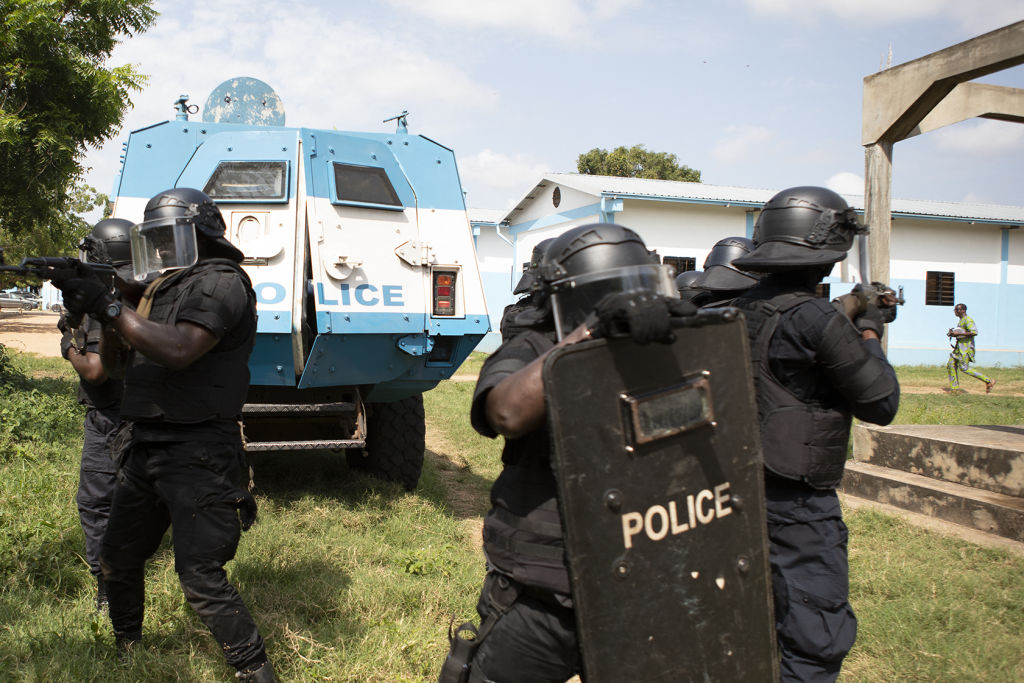ADF STAFF
In late 2022, Togolese gendarmes stormed a restaurant in a counterterrorism exercise that simulated a response to a terrorist attack. For Togo, this type of training has become all the more urgent as violence spreads from the Sahel toward coastal nations.
Togo was mostly spared from extremist violence until last year, when attacks near the northern border began to increase. Togolese authorities have reported at least five attacks claimed by groups affiliated with al-Qaida or the Islamic State since January. The violence prompted the government to extend a six-month state of emergency in the northern Savanes region that shares a border with Burkina Faso.
“The President instructed us to take all necessary measures to ensure that we can protect our people, that we can deal with this threat that is making headlines in our region,” Togolese Security Minister Damehame Yark said in an Al Jazeera report.
During a United Nations Security Council meeting in mid-May, U.N. Assistant Secretary-General for Africa Martha Pobee lamented the failure of international, regional and state peacekeeping efforts to prevent the Sahel’s violence from spreading.
“Resolute advances in the fight against terrorism, violent extremism, and organized crime in the Sahel desperately need to be made,” Pobee said in an Al Jazeera report. “The devastating effects of the continuing destabilization of the Sahel would be felt far beyond the region and the African continent.”
Pobee called for greater international support and regional cooperation to help stem the spread of violence.
Regional efforts, such as the G5 Sahel Joint Force, have been plagued by a lack of funding. The G5 initially included forces from Burkina Faso, Chad, Mali, Mauritania and Niger, but Mali’s military government withdrew from the force last year.
Mali contracted with Russia’s Wagner Group mercenaries as a security provider, but, as in other parts of Africa where the group operates, violence targeting civilians is rising. The group was linked to 726 civilian fatalities on the continent last year, according to the Africa Center for Security Studies (ACSS).
At the U.N. Security Council meeting, Eric Tiaré, executive secretary of the G5 Sahel, said military experts have completed a new concept of operations that will be sent to the African Union to be endorsed.
“Given that the Sahel is at a crossroads, as it is seeing many threats to international peace and security, it’s absolutely vital that we provide support to the force,” Tiaré said. “The force needs what it has always lacked and what it has always sought — that is sustainable funding and equipment as we seek to counter terrorism.”
That kind of support would be timely, as extremist violence killed more than 19,100 people in Africa in 2022, a 48% increase over the previous year, according to an ACSS report.
In 2022, Burkina Faso alone experienced a 400% increase in violent incidents that mostly involved the al-Qaida-affiliated Jamaa Nusra al-Islam wa al-Muslimin, or JNIM, according to Armed Conflict Location & Event Data Project.
Several analysts have said that increased international support — and enhanced cooperation on the continent — may help stem the violence that has spread into other West African nations bordering the Sahel.
“The risk of contagion into the coastal states is not a risk anymore, it’s a reality,” European Council President Charles Michel said in an Al Jazeera report. “We all need to identify the best way to have an impact on the ground.”
Michel’s made his comments during the Accra Initiative security conference in late 2022. The initiative, which includes leaders from Benin, Burkina Faso, Côte d’Ivoire, Ghana and Togo, agreed to assemble a multinational military force to help stop the spread of violent extremism.
In late May, leaders with the Economic Community of West African States (ECOWAS) met with Accra Initiative members in Ghana to discuss cooperation to battle terrorism, violent extremism and transnational organized crime.
During the visit, the ECOWAS delegation toured the Multinational Joint Task Force of the Accra Initiative, or MNJTF/AI, a key component of the Accra initiative, to assess to assess the operational capabilities and preparedness of the force. ECOWAS leaders pledged unwavering support for the MNJTF/AI.
In March, the United States government promised $100 million over 10 years to strengthen counterterrorism efforts in West Africa. Besides countering rebel forces, the support will help thwart Wagner Group mercenaries, whose operations have further destabilized the region, including by allying with Mali’s military junta, U.S. officials said.

